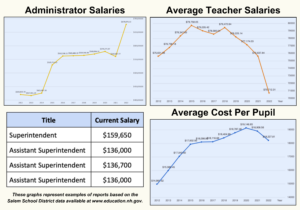SB 219, The Students First Act, passed the Senate unanimously on March 21 and will be considered in an executive session of the House Education Committee on Monday, April 22. You may or may not have heard of this modest bill designed to increase expense reporting transparency by NH school districts, but its importance can’t be understated. Here’s why.
With local appropriations to school districts doubling from $1.09 billion to $2.19 billion since 2001, you might think that the last two decades of ballooning taxpayer investment has reaped the reward of helping more Granite State students achieve better education outcomes.
In fact, just the opposite is true. Since 2001, public school enrollment in the Granite State has declined by 14%, and students’ scores in math and reading have fallen while the national average has increased by a full 15 points.
So, how is this money being spent? In short, on an increasingly bloated roster of school administrators and overseers. Between 2001 and 2019, New Hampshire district administrators and instructional coordinators increased by 57% and 61% respectively. These non-teaching staff include DEI consultants and auxiliary superintendents who enjoy six figure salaries while often failing to demonstrate any return on the taxpayers’ considerable investment in their hiring.
Transparency is key to turning around the disturbing downward trajectory of education quality against skyrocketing costs in our state. SB 219 would do just that by putting the spotlight on school district budgets through a simple reporting requirement without creating new costs or burdens on taxpayers or district staff.
By requiring school districts to report salaries for administrative positions and DEI consultants ahead of local school budget meetings, SB 219 would shed light on these obfuscated costs for taxpayers before they are forced to foot the bill.
Currently that information is technically accessible online, but it is well hidden, requiring hours of effort and patience for any taxpayer who seeks it. This essentially puts it out of reach for the vast majority of residents. However, school districts already have this highly relevant budget information at their fingertips and could easily present it in a clear and easy-to-understand format such as the examples below.

However, based on this financial information’s technical, if dubious, “availability,” teachers union bosses and superintendents who oppose SB 219 argue this requirement is redundant. In reality, they are terrified of how taxpayers would react if they could clearly see these spending trends.
During the pandemic, schools learned their lesson that public transparency is the enemy to achieving their progressive aims. The more their woke agenda was uncovered in the classroom, the more resistance it faced from concerned parents and others. Is it any wonder they are up in arms over SB 219 and the prospect of having their DEI-focused spending priorities revealed?
This bill is actually neutral on school district budgets themselves. What it does do is help appropriately focus the conversation on how education dollars are spent and ensures that budgets aren’t viewed in a data vacuum or misrepresented. Instead, voters would be able to understand how we are hiring and paying administrators within the context of historic spending trends. SB 219 would empower taxpayers to decide whether to reallocate some of the district administrators’ considerable portion of the $2 billion NH school budget pie to teachers’ salaries and other resources they believe provide the greatest educational value and ROI.
All Granite Staters who want to know how much, to whom, and for how long they’ve been shelling out their hard-earned money in the name of education should speak out in support of SB 219 before the April 22 House Education Committee executive session.
If we don’t demand the transparency we deserve from school boards now, they won’t think twice before continuing to impose ever-skyrocketing administrative salaries on already tax-burdened localities and residents. But it is our children who will ultimately pay the highest price if the quality of their education continues to be sacrificed on the altar of funding bloated, ideologically driven school systems and administrators over teachers and students.


